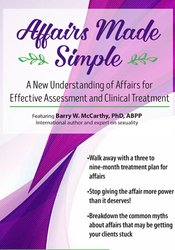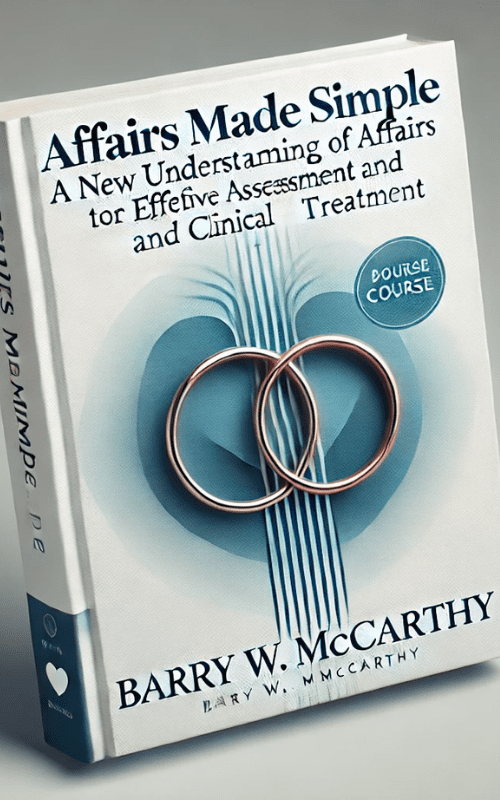Affairs Made Simple -A New Understanding of Affairs for Effective Assessment and Clinical Treatment – Barry W McCarthy
Affairs Made Simple -A New Understanding of Affairs for Effective Assessment and Clinical Treatment – Barry W McCarthy has the same quality as the author’s salapage.
Overview
Salepage check: Affairs Made Simple -A New Understanding of Affairs for Effective Assessment and Clinical Treatment
Author: Barry W McCarthy
- Faculty:
- Barry W McCarthy, PHD, ABPP
- Duration:
- 6 Hours 28 Minutes
- Format:
- Audio and Video
- Copyright:
- Jul 26, 2018
Description
Affairs are all too common, approximately 35-45% of marriages experience an affair, and as a clinician you likely have a couple or individual on your case load who is struggling with the wounds of an affair.
Watch this recording and leave with a three to nine-month treatment plan for affairs that save your clients’ time, money and energy! This is a huge improvement from the traditional model that takes years to treat couples who’ve experienced an affair.
Most clinicians are approaching treatment wrong by giving the affair more power than it deserves, which causes the injured partner to get stuck. Rather than remaining stuck in the traditional model of an affair as a symptom of a relationship problem, this workshop provides you new skills in understanding, assessing, and treating affairs through a whole new lens.
Affairs are multi-causal, multi-dimensional, with a range of individual, couple, cultural, and value factors and meanings. Successful treatment requires you to carefully assess (rather than assume) the causes and meanings of the affair from the perspective of the involved and injured partners. Through this workshop, you will develop an effective model for assessment which leads to more successful clinical outcomes.
After watching this recording, you will be more prepared as a clinician to help the couple make a “wise decision” about whether to recommit to a satisfying, secure marriage or move toward a good divorce. If the decision is to recommit, you will gain skills to support the recommitted couple with tools for sexual recovery and creating an individualized affair prevention plan.
Stop giving the affair more power than it deserves and gain a new understanding on how to more effectively treat affairs!
Handouts
| Manual (1.17 MB) | 64 Pages | Available after Purchase |
Outline
Confront Myths and Mistaken Assumptions about Affairs
- Affairs are always a symptom of a relationship problem
- Most couples divorce after an affair
- Rebuild the trust bond before anything else
- Touching and sexuality should not be attempted in the first year of healing from an affair
- New data, research and cultural changes on the role, meaning, and outcome of affairs
Implement a Four-Session Assessment Model
- Importance of conducting first session as a couple
- Conduct the psychological, relational and sexual history individually
- How and when to disclose sensitive, secretive information
- Role play aspects of the couple feedback session
Treatment Model for Different Types of Affairs
- Understand the different types of affairs
- High opportunity/Low involvement affair
- Compartmentalization affair
- Comparison or love affair
- Most vs least common type and easiest vs hardest type to treat
- Do not give the affair more power than it deserves
- Help couple understand the type of affair
- Six month “good faith” effort to make genuine meaning of the affair
- Indicators the couple can recommit to the marriage
- Signs the couple may benefit from a “good divorce”
- Create a new couple sexual style and a new trust bond
- Foster genuine acceptance and forgiveness
- Tools for sexual recovery
- An individualized affair prevention plan
Vulnerabilities and Challenges with Affair Prevention
- Awareness of vulnerabilities regarding person, mood, and situations for future affairs
- Confront the myth that “once a cheater, always a cheater”
- Dialogue and agreement about monogamy vs. consensual non-monogamy
- Confront the manipulative or coercive partner
- Value of satisfying, secure, and sexual relationship
- Respect that “sexually, one size does not fit all”
Cultural Considerations in Understanding the Role and Meaning of Affairs
- Non-American cultural differences
- Religion, politics and social economic class
- Special considerations with gay and lesbian couples
- Keep personal value and judgement aside when meanings differ
Clinician Personal and Professional Values Regarding Affairs
- Assess your personal values regarding affairs
- Tools to define your interest, competence, and values
- Be aware of personal values and judgements when client meanings differ
- When to refer due to differing values
Faculty

Barry W McCarthy PHD, ABPP Related seminars and products: 7
Barry W. McCarthy, PhD, ABPP, is a board certified clinical psychologist (ABPP), certified marital and sex therapist, and a tenured professor of psychology at American University. His clinical expertise focused on integrating sex therapy strategies and techniques into individual and couple therapy, assessment and treatment of the most common male and female sexual problems, and a special expertise in the treatment of sexual desire disorders.
Dr. McCarthy earned his BA from Loyola University and his MA and PhD from Southern Illinois University. His professional memberships include the American Psychological Association, American Association of Marriage and Family Therapy, Society for Sex Therapy and Research, and Association for Behavioral and Cognitive Therapies. He is a Diplomate in sex therapy earning this from the American Association of Sex Educators, Counselors, and Therapists.
As a leading expert in this field, Dr. McCarthy has presented over 350 workshops around the world, and his extensive list of publications includes over 100 professional articles, 26 book chapters, and co-authorship of 14 books, including Rekindling Desire (2nd edition), Sexual Awareness (5th edition), Enduring Desire, Discovering Your Couple Sexual Style, Men’s Sexual Health, Coping with Erectile Dysfunction, Getting It Right the First Time, and Coping with Premature Ejaculation.
Curriculum
FAQs
Requirements
- Professional Background: Participants should have a foundational understanding of clinical psychology, counseling, or therapy practices.
- Educational Prerequisites: A minimum of a bachelor's degree in psychology, counseling, social work, or a related field is recommended.
- Clinical Experience: Prior experience in individual or couples therapy will enhance comprehension and application of course materials.
Features
- Comprehensive Assessment Model: Learn a four-session psychobiosocial assessment approach to understand the perspectives of both the involved and injured partners.
- Tailored Treatment Plans: Develop individualized strategies that align with the specific goals and needs of each couple.
- Narrative Development: Create authentic narratives about the affair to facilitate informed decisions regarding recommitment or separation.
- Monogamy Agreements: Formulate agreements for couples recommitting to monogamy or considering consensual non-monogamy.
- Affair Prevention Strategies: Design personalized plans addressing vulnerabilities and establishing preventive measures against future affairs.
Target audiences
- Mental Health Professionals: Psychologists, counselors, social workers, and therapists seeking to deepen their expertise in affair-related therapy.
- Marriage and Family Therapists: Practitioners aiming to enhance their skills in addressing infidelity within relationships.
- Sex Therapists and Educators: Professionals focusing on sexual health and relationship dynamics.
- Addiction Counselors: Specialists interested in understanding the interplay between addictive behaviors and infidelity.
- Pastoral Counselors and Ministers: Clergy members providing guidance on marital issues and seeking evidence-based therapeutic approaches.


